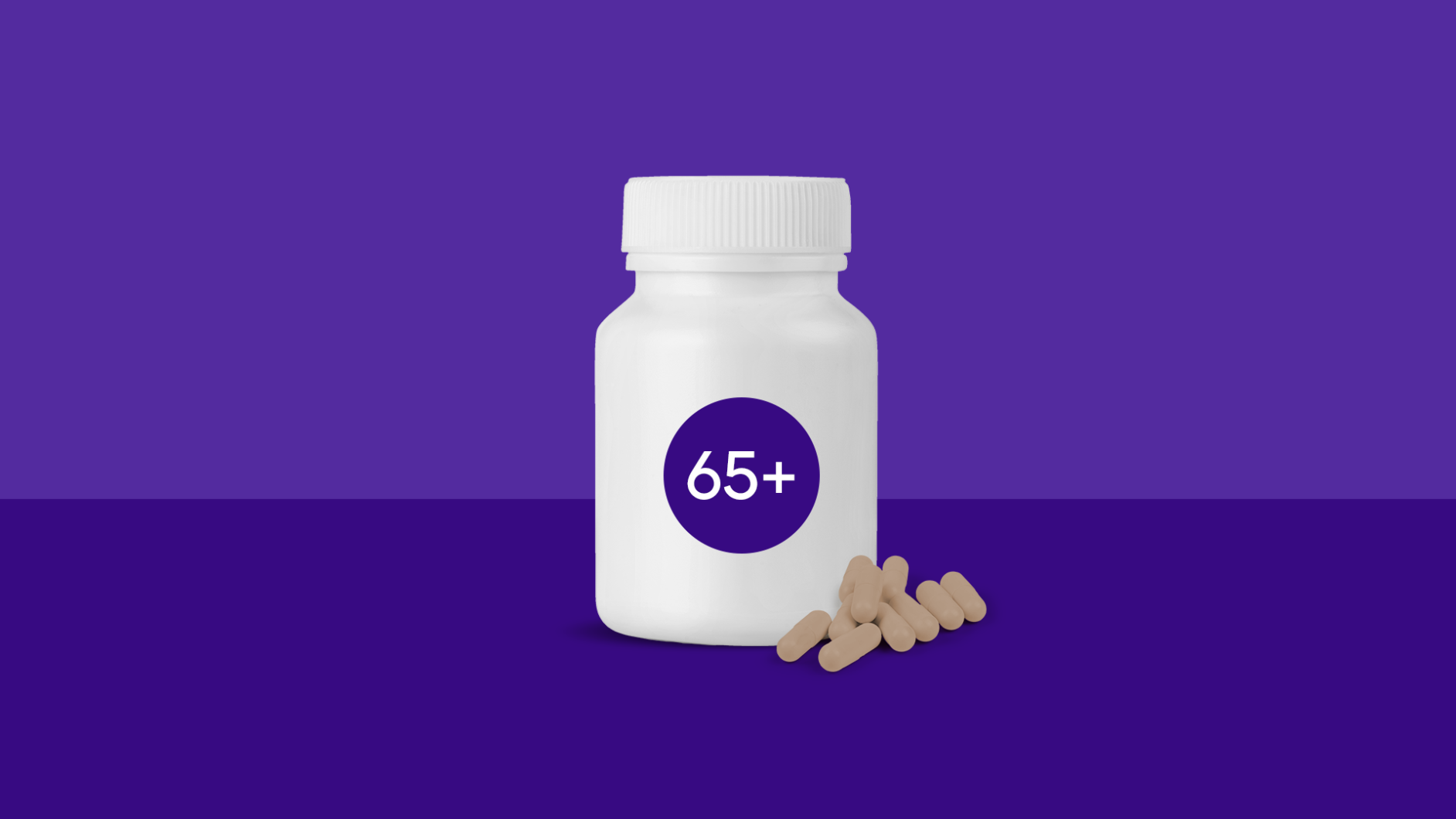Staying healthy is important at any age—with a balanced diet and exercise (for your mind and body). As you get older, the things you need to keep your brain active and your body fit change.
You may already do regular aerobic and strength-training exercises. Or, eat lots of protein, fruits, and vegetables. But is that enough? Nutritional needs shift as you add more candles to your birthday cake, which means some older adults may look to vitamins for seniors to make sure they’re getting enough of what’s recommended.
“As with any age group, older adults may not be meeting all of their nutrient needs with food alone,” says Amy Gorin, MS, RDN, a registered dietitian in the New York City area. “As you get older, you may be eating less, due to decreased appetite and also decreased taste sensitivity, and eating less makes it harder to meet your nutrient needs. Also, seniors have certain nutrient requirements that are different from those of younger adults.” Read on to learn the most important ones.
5 essential vitamins and nutrients for older adults
There are a number of essential nutrients and vitamins that you should be getting through your diet or supplements as you age.
1. Calcium
Half of adults aged 50 and older are at risk of breaking a bone. So, getting enough calcium is essential for seniors to support bone health.
Food sources: The Academy of Nutrition and Dietetics recommends three servings of low-fat or fat-free servings of dairy each day. Calcium-rich foods like fortified cereals and fruit juices, dark-green leafy vegetables, canned fish with soft bones, and fortified plant-based beverages can help meet your daily needs.
Recommended dose: Women ages 51 to 70 years old should get 1200 mg of calcium a day, while men ages 51 to 70 years old should get 1000 mg each day. The dose of calcium vitamins for all seniors over age 70 increases to 1200 mg a day.
2. Vitamin D
Vitamin D helps with calcium absorption, and also boosts immune function.
Food sources: Vitamin D can be found in fatty fish (like salmon), eggs, and fortified foods and drinks. If you’re averse to these foods, or can’t get enough through your diet, a calcium supplement fortified with vitamin D can help.
Recommended dose: The recommended dose changes with each passing decade. In your 50s and 60s, 600 international units (IU) fulfill that need. In your 70s the recommended dose rises to 800 IU, preferably of vitamin D3. Gorin recommends that “since vitamin D is a fat-soluble vitamin, you should take it with a food that contains fat for best absorption.”
3. Vitamin B12
Vitamin B12 should also be on your radar. Up to 15% of adults are deficient in this nutrient that helps with red blood cell formation, cell metabolism, nerve function, and bone health. Get too little and you may experience tingling or prickly feelings in your legs or hands, have a hard time walking, become more forgetful, see changes in your personality, feel weak, or suffer from anemia. Some research shows that slight deficiency can lead to dementia in older adults. Vitamin B12 deficiency increases with age.
Food sources: Vitamin B12 comes from foods like meats, fish, shellfish, eggs, and milk. If you’re not consuming enough, you might look to a supplement to prevent deficiency.
Recommended dose: The daily recommended amount of this nutrient for adults older than 60 is 2.4 micrograms (mcg), but it’s not toxic so you don’t have to worry about taking too much.
RELATED: 9 common nutrient deficiencies in the U.S.
4. Fiber
Fiber is another biggie. It helps lower your risk of heart disease, diabetes, cardiovascular diseases, and some cancers. It can also help lower your cholesterol.
Food sources: Fiber is found in a range of foods from whole-grain breads, pastas and cereals, beans and nuts, vegetables like cauliflower, broccoli and spinach, and fruits like berries, oranges and apples.
Recommended dose: Women over 50 should get 21 grams a day; that number jumps to 30 grams for men of the same age.
5. Omega-3s
“Omega-3s EPA and DHA” are also important, says Gorin. “These nutrients help your heart health, brain health, and more. And heart and brain health are of particular concern to older adults.
Food sources: “If you aren’t eating at least two 3.5-ounce weekly servings of cooked fatty fish like salmon, sardines, and herring in your diet,” Gorin says, “then I’d recommend you take a daily supplement.”
Recommended dose: The recommended dose is 1,000 milligrams of DHA and EPA per day.
| Vitamin | Benefit | Daily dosage | Coupon |
| Calcium | Bone health | 1,000-1,200 mg | Calcium coupon |
| Vitamin D | Calcium absorption, immune function | 600-800 IUs depending on your age | Ditamin D coupon |
| Vitamin B12 | Cell formation and metabolism, nerve function, bone health | 2.4 mcg | Vitamin B12 coupon |
| Fiber | Lowers risk of heart disease, diabetes, and some cancers, and helps decrease cholesterol | 21-30 g | Fiber coupon |
| Omega-3s | Heart and brain health | 1,000 mg | Omega-3s coupon |
To use a SingleCare discount on over-the-counter supplements, you’ll need your doctor to write a prescription first. Find out more, here.
Choosing the best supplement for you
Supplements can also help those with specific diet and food preferences, such as people who don’t like a lot of vegetables or those who eschew dairy. Supplements can take the form of a pill, a gummy, or powder you stir into water.
You might look into a multivitamin for seniors. These typically give you the daily dosage of the vitamins and nutrients you need–including vitamins B12, D, and calcium–and less of what older people typically get enough of from their diets alone.
“When you buy a multivitamin for a specific set of the population, that supplement contains nutrients specifically tailored,” says Gorin. “A women’s formula, for instance, may contain higher amounts of vitamin B6 and vitamin B12, and calcium. It also contains less of certain nutrients that older women don’t need as much of, such as iron.”
RELATED: Do multivitamins for women actually work?
When taking a supplement—be it nutrient-specific or a multivitamin—talk to your doctor about what’s best for you. You also want to:
- Read the label carefully and follow directions for use.
- Look for supplements with the USP or NF on the label, which means that the manufacturer followed US Pharmacopoeia standards in making the product.
- Take note of any side effects you experience while using.
To avoid potential side effects, you can take certain precautions, like starting with a lower dosage and gradually increasing to the recommended daily dosage, or drinking plenty of water. Upping your intake too quickly can result in bloating, gas, and cramping for certain supplements.
Supplement interactions
“It’s a good idea to let your pharmacist and doctor know all the medicines and supplements you’re taking to check for possible interactions,” says Gorin.
If you are planning on taking calcium and vitamin D supplements, make your doctor aware especially if you have kidney disease, past or present kidney stones, heart disease, circulation issues, or a parathyroid gland disorder.
Vitamin B12 interactions typically have to do with other drugs or supplements reducing the amount of B12 you absorb. For example, if you are taking both vitamin B12 and vitamin C supplements, this combination might reduce the available amount of B12 in your body. Avoid this by taking vitamin C two or more hours after taking your vitamin B12 supplement. Check with your healthcare provider before taking B12, as it can interact with many other medications, such as certain seizure or heartburn medications.
Fiber supplements can reduce the absorption of some medications, like aspirin, carbamazepine which is used to treat epilepsy, and others. Fiber supplements might lower blood sugar levels; if you have diabetes this may mean an adjustment in your insulin or other medications you’re taking. Your healthcare provider will decide if any adjustments or changes are necessary.
Some people may take plant- or oil-based supplements, which also have interactions to be aware of. “If someone is taking blood thinners—Coumadin, Pradaxa, Xarelto—they need to be careful about supplements like ginseng, garlic, green tea, St John’s wort, fish oil, feverfew, valerian root,” says Cynthia Thurlow, NP, an intermittent fasting and nutrition expert. Those taking “anti-seizure medications need to be careful with evening primrose oil, and those taking antidepressants need to be careful with valerian root and St John’s wort.”
No matter the supplement you choose, make sure to consult with your healthcare provider and pharmacist to make sure you’re being safe.
READ NEXT: 3 types of medications that could have a vitamin interaction











